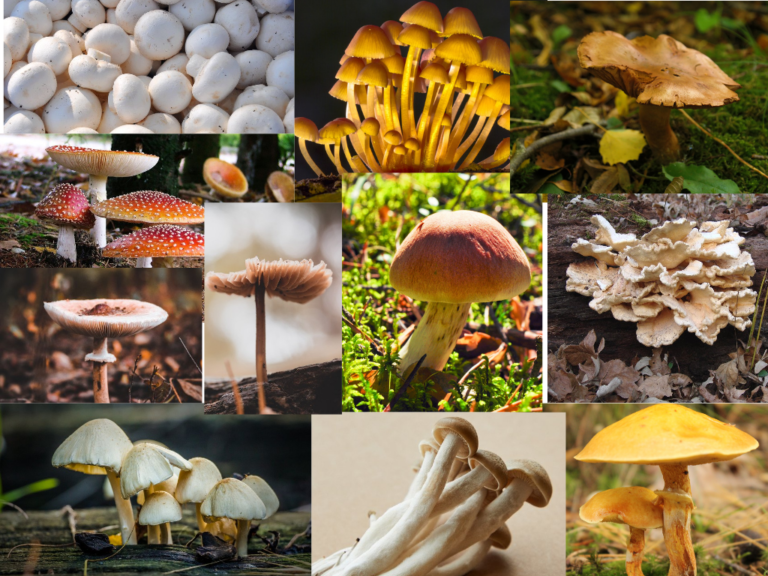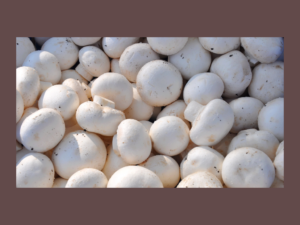Mushrooms and their edible varieties
Mushrooms are the fungi with plenty of nutritional profile. There are numerous varieties of mushrooms. Some of which are edible and they have been a part of human diet. Some of the varieties of mushrooms are actively used for medical purposes too. However, not all kinds of mushrooms are safe to consume. Some mushrooms like Amanita phalloides are poisonous and Amanita muscaria causes vomiting & stomach cramps. Many of the mom’s thoughtful question across is ‘can babies eat mushrooms?’ The answer to this question is yes but it is essential to choose right kind of mushroom to add it in your baby’s meal plan.

There are almost 2,000 different species of edible mushrooms. Out of these, the most popular edible variety in India is Agaricus bisporus. This kind of mushroom is available in three different forms as white button, cremini and Portobello. Followed by white mushrooms, shiitake, straw, oyster, chanterelle, morel, porcini and enoki are consumed popularly across the world.
When can mushrooms be given to babies?
There are no clinical or non clinical recommendations for feeding mushrooms to babies. Generally, mushrooms are given to babies once they are six months old when they usually start solids. But most of the parents would wait until 12 months of age. Mushrooms are safe for babies but certain varieties of mushroom may cause discomfort and some mushrooms which has toxic property may be life threatening too. So it is better to consult your pediatrician and learn the right mushroom variety before starting mushrooms in your baby’s food plan.
Nutritional value of mushrooms
Mushrooms are much valued for their unique taste and nutritional composition. Each and every variety has its unique nutritional value; here is a general nutritional profile with the quantities of key nutrients.
- 80-90% of water content.
- 8-10% of dietary fiber.
- 12-35% of protein.
- Vitamin C, B1, B2, B3, B9, D2.
- Minerals like potassium, sodium and phosphorus.
Health benefits of mushroom
Mushrooms aren’t exactly referred as ‘super food’ but all the above said nutrition help support your baby’s growth and development. The following are the health benefits of mushroom.
- Mushroom posses bioactive immunity strengthening properties like polysaccharides, triterpenoids which can boost innate and acquired immunity.
- The enhanced prebiotic content of mushroom stimulates the growth of microbiota that helps attenuate conditions like obesity and cancer in long run.
- Polysaccharides in mushroom are attributed to its anti oxidative effects.
- Other nutritional components in mushroom attributes towards anti-inflammatory, anti- microbial property. Also improves digestion.
Mushrooms strengthens bones and teeth, boosts immunity regulates blood pressure, helps to fight cancer cells, prevents diabetes, boosts heart health, helps in maintaining healthy skin, aids in proper functioning of the brain and nervous system, promotes good vision.

Are babies allergic to mushrooms?
Any food can potentially cause an allergic reaction in babies. Mushrooms are not considered as a common allergen. But, it’s always a good idea to look for the signs of a possible reaction. If mushroom causes allergy, it shows up within minutes to few hours after eating. Hives, itching, swelling in the skin, sneezing, throat tightness, trouble swallowing, nausea, vomiting, stomach pain, diarrhea, trouble breathing can be the possible reactions for allergy. It may turn up to severe and if poisonous variety of mushroom is consumed without knowing, it can be life-threatening too. In case, if any of the allergic reactions are found, call immediately or rush up to your pediatrician.
Tips to select & store mushroom
Only buy fresh mushrooms which are marked as edible.
Clean mushrooms properly before cooking – wash with water and rub with hands on the mushrooms.
Mushrooms can be stored in a paper bag for 2-3 days.
Short recipe ideas of mushrooms
Mushrooms can be a valuable addition to your baby’s meal plan. Here are few ideas to help you determine how to serve mushrooms to your baby that you might like and try to compliment your baby’s daily meal.
- Mushroom potato puree/ Mushroom sweet potato puree – Boil potato/ sweet potato with mushrooms. Blend it and it can be served for 6-8 months baby.
- Mushroom soup – Fry finely chopped garlic, onion, tomato, mushroom with butter in a heavy bottomed pan. Add salt, black pepper powder, turmeric powder and let it boil in water. Other veggies can also be added to mushrooms. Once the mixture is thickening, turn off the flame and it can be served.
- Marinated mushroom stripes – Cut mushrooms as thin slices. Marinate with lemon juice, chopped garlic, fresh herbs and little chilly powder before sautéing or grilling. It can be served as a finger food to babies.
- Mushroom toaster pizzas – Thinly sliced and sauté mushroom can be added as topping for your babies favorite healthy pizza made out of wheat dough.
- Mushroom balls – Fold finely chopped mushrooms mixed with flour of your choice may be wheat flour with salt and chilly powder added and roll it into small balls and make them fry. It can be severed as finger food.
- Mushroom chili – White button mushrooms are coated in a spiced curd batter and then deep fried.
- Mushroom gravy – Make a paste with boiled onions, tomatoes, ginger, garlic cloves and few cashew nuts. With added spices and masalas, add the paste and sauté the mushrooms. Add water and let it cook well. It can be served with rice and chapatti.
- Mushroom biriyani – In a cooker, add oil, spices then onion, tomato, ginger garlic paste, mint leaves, coriander leaves, mushroom with added masalas. Add soaked basmati rice along with required water. Let the rice cook well.
The Takeaway
Mushrooms have a lot of nutritional value. But before starting mushrooms in your baby’s diet, consider asking advice from your pediatrician. Choose right variety of edible mushroom and make a valuable addition of nutrition to your baby’s meal plan. Let your baby enjoy unique taste of mushrooms.
References
- https://www.ncbi.nlm.nih.gov/pmc/articles/PMC4320875/ Edible Mushrooms: Improving Human Health and Promoting Quality Life.
- https://www.medicalnewstoday.com/articles/278858#benefits Nutritional value of mushrooms.
- https://www.sciencedirect.com/science/article/pii/S2213453018300478 A critical review on the health promoting effects of mushrooms nutraceuticals.

